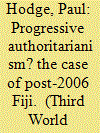| Srl | Item |
| 1 |
ID:
136139


|
|
|
|
|
| Summary/Abstract |
Drawing predominantly on the work of Butler, Rose and Walters, this paper examines the governing rationalities and technologies that characterise one particular site of aid relations. Focusing on key policy documents, economic surveys and performance reports, the paper traces the fashioning of particular subjectivities as constitutive of AusAID's development objectives and the function of problematisation and responsibilisation as central to these practices of subjectivation. While I argue the freedom on offer as part of AusAID's development objectives is a highly governed one – where the ‘free’ economic-rational subject adopts certain ‘civilised sensibilities’ (Rose, 1999: 78), I show how this process of subjectivation encompasses both ‘a power exerted on a subject’ and ‘a power assumed by the subject’ (Butler, 1997: 11). What becomes apparent through this analysis is the productive and tenuous characteristics of these practices of subject formation. This paper also foregrounds the practice of critique itself, and the very act of research; concepts adopted and explanations made, as far from innocent in their performativity in enacting some worlds and not others.
|
|
|
|
|
|
|
|
|
|
|
|
|
|
|
|
| 2 |
ID:
123519


|
|
|
|
|
| Publication |
2012.
|
| Summary/Abstract |
Post-development has matured well beyond the romanticism and celebration of the local of its early proponents. The new 'conditions of possibility' that embody the latest contributions to the field are studies in governmentality. This paper explores the heterogeneous postcolonial spaces of post-2006 Fiji by deploying a Foucauldian analysis of Bainimarama's government, particularly focusing on the formation of identities and the attributes of a 'normalised citizenry'. The analysis aims to help explain why the implementation of a liberal rationality, in the form of racial equality for socio-political change in the country, calls for citizens to be subjected to various arts of government-surveillance, physical and psychological violence and, in some cases, incarceration and torture. An understanding of this brutal and puzzling irony is found in Fiji's colonial legacies and the ongoing contestation over what constitutes a 'normalised citizenry' in the country. I propose that Fiji's present contestations and anomalous coalescence of liberal rationalities and non-liberal means are best explained with reference to the paradoxical notion of progressive authoritarian governmentality.
|
|
|
|
|
|
|
|
|
|
|
|
|
|
|
|